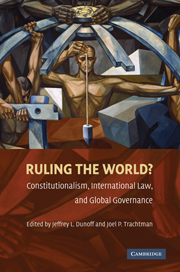Book contents
- Frontmatter
- Contents
- Contributors
- Preface: International Institutions: Why Constitutionalize?
- Acknowledgments
- PART I WHAT IS CONSTITUTIONALIZATION BEYOND THE STATE?
- PART II THE CONSTITUTIONAL DIMENSIONS OF SPECIFIC INTERNATIONAL REGIMES
- PART III CROSSCUTTING ISSUES
- 9 Human Rights and International Constitutionalism
- 10 The Cosmopolitan Turn in Constitutionalism: On the Relationship between Constitutionalism in and beyond the State
- 11 Constitutional Heterarchy: The Centrality of Conflict in the European Union and the United States
- 12 Courts and Pluralism: Essay on a Theory of Judicial Adjudication in the Context of Legal and Constitutional Pluralism
- 13 Whose Constitution(s)? International Law, Constitutionalism, and Democracy
- Index
- References
13 - Whose Constitution(s)? International Law, Constitutionalism, and Democracy
Published online by Cambridge University Press: 05 June 2012
- Frontmatter
- Contents
- Contributors
- Preface: International Institutions: Why Constitutionalize?
- Acknowledgments
- PART I WHAT IS CONSTITUTIONALIZATION BEYOND THE STATE?
- PART II THE CONSTITUTIONAL DIMENSIONS OF SPECIFIC INTERNATIONAL REGIMES
- PART III CROSSCUTTING ISSUES
- 9 Human Rights and International Constitutionalism
- 10 The Cosmopolitan Turn in Constitutionalism: On the Relationship between Constitutionalism in and beyond the State
- 11 Constitutional Heterarchy: The Centrality of Conflict in the European Union and the United States
- 12 Courts and Pluralism: Essay on a Theory of Judicial Adjudication in the Context of Legal and Constitutional Pluralism
- 13 Whose Constitution(s)? International Law, Constitutionalism, and Democracy
- Index
- References
Summary
Introduction
International constitutionalism is en vogue among scholars of general international law. Promoted since the 1930s in Europe and rediscovered in the 1990s, it has meant different things to different people, has been promoted for very different reasons, and has also been criticized on many different grounds. For a long time, the idea of constitutionalism worked mostly as a heuristic device of unification or coherence in times of legal fragmentation within international law and of denationalization of constitutional law, but recently it has also become a catalyst of change and a promise of increased legitimacy both of and within international law.
Interestingly, and by contrast to what has been the case in discussions of European constitutionalism in recent years, international lawyers have only reluctantly started grappling with constitutional theory. They usually focus on what they take as material evidence of constitutionalization in international law, or draw, a contrario, compensatory conclusions from the deconstitutionalization of national law or the internationalization of national constitutional law. Thus, the development of relative normativity in general international law (e.g., the emergence of objective standards, the recognition of imperative international norms, the development of erga omnes rights and duties) and the emergence of new lawmakers besides states (e.g., the development of multilateral law-making under international organizations' (IOs) auspices and the increasing influence of nongovernmental organizations (NGOs)) have gradually become the bits and pieces of a reconstructed international constitutional order, whereas some of them may actually amount to little more than disparate signs of deeper legalization, integration, or institutionalization of international law.
- Type
- Chapter
- Information
- Ruling the World?Constitutionalism, International Law, and Global Governance, pp. 381 - 408Publisher: Cambridge University PressPrint publication year: 2009
References
- 17
- Cited by

